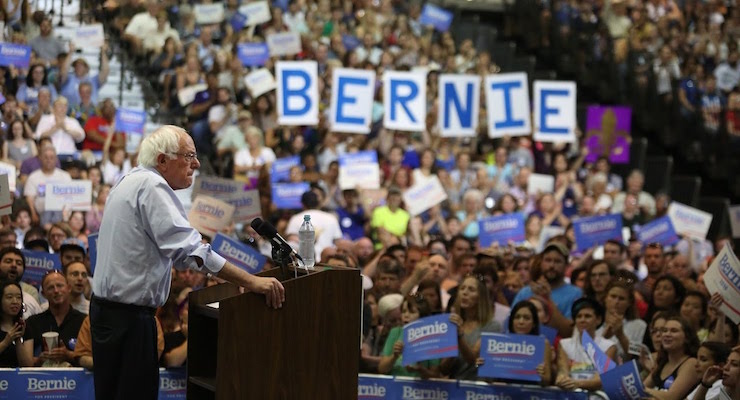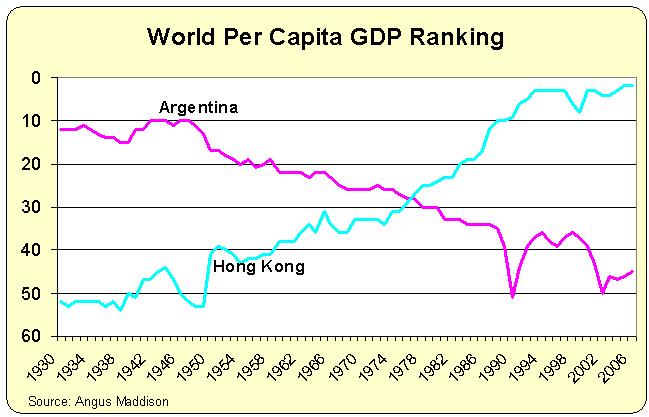

Vermont socialist Sen. Bernie Sanders holds a rally in Pittsburg, Penn., on March 31, 2016.
I’m a proud advocate and defender of capitalism for the simple reason that it is a system that is consistent with human freedom while also producing mass prosperity that was unimaginable for much of human history.
Jurisdictions that embrace capitalism enjoy great progress while nations that veer in the other direction suffer economic decline, as vividly demonstrated by comparisons such as the relative performance of Hong Kong and Argentina.

(Source: Angus Maddison/International Liberty)
And, for what it’s worth, the Princess of the Levant even says capitalism is “a sexy word.”
But not everybody agrees.
A column by Greg Sargent in the Washington Post has some very depressing poll numbers.
…the Harvard Institute of Politics has released a new poll of young voters… One key finding in the poll, which surveyed over 3,000 people from ages 18-29, is that these young people see a robust role for government in guaranteeing a right to a basic standard of living, and majorities of them see a large or moderate federal role in regulating the economy and access to health care and higher education. …A narrow majority of respondents in Harvard’s poll said they did not support capitalism.
Writing for Mic, Marie Solis looks at these recent poll numbers and wonders if the real issue is whether “capitalism” is simply an unpalatable word.
A new Harvard University survey found 51% of the participants between the ages 18 and 29 said they do not support capitalism. …The university’s results echo recent findings from Republican pollster Frank Luntz, who surveyed 1,000 Americans between the ages of 18 and 26 and found that 58% of respondents believed socialism to be the “more compassionate” political system when compared to capitalism. …the results may be more indicative of a shifting connotation for the word “capitalism” itself. “The word ‘capitalism’ doesn’t mean what it used to,” he said. “You don’t hear people on the right defending their economic policies using that word anymore.”
Not so fast. I still use “that word.”
But should I? James Pethokoukis of the American Enterprise Institute is sympathetic to the notion that there’s a perception problem. He speculates that the real problem is that capitalism now has a negative connotation.
America’s millennials are hardly some fifth column of communist sympathizers. Nor are they idiots. But they are at least a bit skeptical of “capitalism.” …Yet, oddly, many of those same capitalism skeptics also hold views similar to those of any Ayn Rand-loving free marketeer. For example: Less than a third believe government should play a large role in regulating the economy, reducing income inequality, or stimulating economic growth. Likewise, just a third said they supported socialism.
I fear Pethokoukis is being too optimistic in his reading of the polling data. When you review the questions in the poll and add together those who want a “large” role for government with those who favor a “moderate” role for government, they overwhelm the advocates of laissez-faire who say government should play “little to no role.”
Though maybe I’m just being a pessimist since the folks who want a “moderate” role may think the government today already is playing a “large” role and therefore would want to reduce the size and scope of Washington (though the fact that many people actually blame deregulation for the financial crisis, notwithstanding all the evidence to the contrary, makes me think that would be a Pollyannish interpretation of the polling data).
In any event, let’s return to the issue of whether capitalism is akin to a toxic brand.
Maybe one problem here is the word “capitalism” and what it evokes in the aftermath of the Great Recession and Wall Street bailout. Maybe “capitalism” really isn’t the right word for the free enterprise system, the deep magic that has made America the richest, most powerful nation on Earth. Indeed, wherever and whenever there’s been a bit of economic freedom, amazing things have happened — from Europe in the 1800s to China and India in the late 20th century. …Maybe millennials aren’t capitalists as much as they are “innovists” or “innovationists.” They believe the same dynamic economic system that created those amazing panes of internet-connected glass in their pockets will also create a better world.
It galls me that young people blame capitalism for the financial crisis. Have they ever heard of the Federal Reserve? Or Fannie Mae and Freddie Mac?
Blaming capitalism for the recent mess is like blaming the Red Cross for tornadoes. Sounds like millennials don’t know the difference between capitalism and cronyism.
But I’m digressing again. Time to get back to the central topic. Elizabeth Nolan Brown weighs in with a column for Reason.
…this new poll finds young people torn between “capitalism” and “socialism,” with perhaps little—or, to be more charitable, an ahistorical—understanding of what either means.
I definitely agree with her than millennials are confused about what these terms mean.
But grousing about their lack of knowledge doesn’t solve the problem. But maybe we can make progress if we learn why young people think the way they do.
…words—especially big, emotionally-laden words describing controversial or complicated concepts—connote different things to different people. When pollsters probe young people further about socialism and capitalism, they tend to find that respondents don’t have clear concepts of these economic philosophies. To many millennials, “socialism” doesn’t mean a government-managed economy but something like what we have now, only with more subsidized health care, student-loan forgiveness, and mandatory paid parental leave. …”Capitalism,” meanwhile, doesn’t simply mean private, for-profit enterprise. …Capitalism is Big Banks, Wall Street, “income inequality,” greed. It’s wealthy sociopaths screwing over the little guy, Bernie Madoff, and horrifying sweatshops in China. …However incomplete or caricatured, these are the narratives of capitalism that millennials have grown up with.
She basically comes to the same conclusion as Pethokoukis.
We certainly need to consider whether and how the word can be reclaimed, or if we’re better served talking about the “market economy,” “private enterprise,” “free trade,” or “entrepreneurship.” Millennials love the word entrepreneur… Unlike anti-capitalists of yore, young people today don’t seem to see a tension between turning a profit and living righteously. …As John Della Volpe, polling director at Harvard, puts it, millennials aren’t “rejecting the concept” of capitalism. “The way in which capitalism is practiced, in the minds of young people—that’s what they’re rejecting.”
Indeed, she shares some 2014 polling data that shows there is 2-1 support for free markets, which is significantly better than the level of support for capitalism.
This analysis is persuasive. If we can convince more people to support good policy by talking about “free markets” rather than “capitalism,” then I have no objection to using a more effective phrase or word.
For what it’s worth, opponents of economic liberty such as Karl Marx were among the first to use the term “capitalist” and they obviously meant it as a slur. Which is another reasons why advocates of economic liberty shouldn’t feel obliged to use that word.
That being said, I’m not sure whether using a different word or phrase will make a big difference. I remember when Social Security reform was a big issue between 1995-2005. Proponents were repeatedly told that “private” and “privatization” were words to avoid, so we all dutifully said we were for “personal retirement accounts.”
Which was fine, but it didn’t stop leftists from using “privatization.” Moreover, polling data showed considerable support for the idea, notwithstanding demagoguery from advocates of the status quo.
Now that we’ve discussed whether “capitalism” is a bad word, let’s shift gears and look at whether “liberal” should be a good word.
Professor Daniel Klein says the word has been hijacked by statists.
Here I make a plea, addressed to conservatives and libertarians, regarding the word liberal: please do not describe leftists, progressives, social democrats, or Democrats as “liberal.” …Words have deep-seated cognates and connotations; they have character and history. …The term liberal has always had an abundance of positive connotations: generous, open-minded, tolerant, big-hearted. …to oppose “liberals” almost seems tantamount to opposing modern, open civilization.
And “liberal” originally was linked to economic liberty and free markets.
The inception of liberal as a political term should be credited to the Scottish historian William Robertson, who published a book in 1769 that uses the term repeatedly to mean principles of liberty and commercial freedom. Adam Smith…used the term repeatedly in a signal way to refer to the sort of policy he advocated, a system that gives a strong presumption to individual liberty, and hence commercial and market freedom. …The principles of Adam Smith spread throughout Europe, as did the name he used for them, “liberal.” …so “liberal” political movements were born.
But then the statists began to call themselves liberals.
At the end of the nineteenth century, and thereafter, there came a dramatic shift. Collectivism or statism was on the rise. …Especially during the period 1880 to 1940, there came great changes in the meanings of words, changes in semantics. …people started using words in new ways, and often even announced and emphasized the newness of their usage and meaning. …the statists arrogated the term liberal to themselves… The literature of the so-called New Liberals declaimed openly against individual liberty and in favor of state collectivism and socialistic reform.
Interestingly, the bastardization of “liberal” has primarily occurred in the United States and Canada.
…when we step outside North America, we see that, by and large,liberal still means liberal…read and listen to European Parliament member Daniel Hannan, who often uses liberal proudly in its original sense, and who never calls leftists “liberal,” or to read the journal of the Institute of Economic Affairs (London)—Economic Affairs: A Journal of Liberal Political Economy. …In Prague, for example, the leading freedom-oriented organization is called the Liberal Institute. Where liberal still means liberal, such as in Europe and Latin America, leftists have no reluctance in calling their imaginary bogeyman “neoliberalism.”
I can vouch for that. I’m often accused of being a “liberal” or “neo-liberal” when speaking overseas. It took a while to get used to it, but now I smile and say “yup, that’s me.”
And I’ll sometimes use “classical liberal” and “libertarian” interchangeably when speaking in the United States. But given the way the meaning of the word has changed over time, I don’t think it would make sense to the average person if I referred to myself as “liberal.”
That being said, I fully agree with Professor Klein that we shouldn’t let leftists get away with using that term to describe themselves. I prefer to describe them as “statists.”
P.S. Tom Sowell has a more controversial, but technically accurate, term to describe modern leftists.







